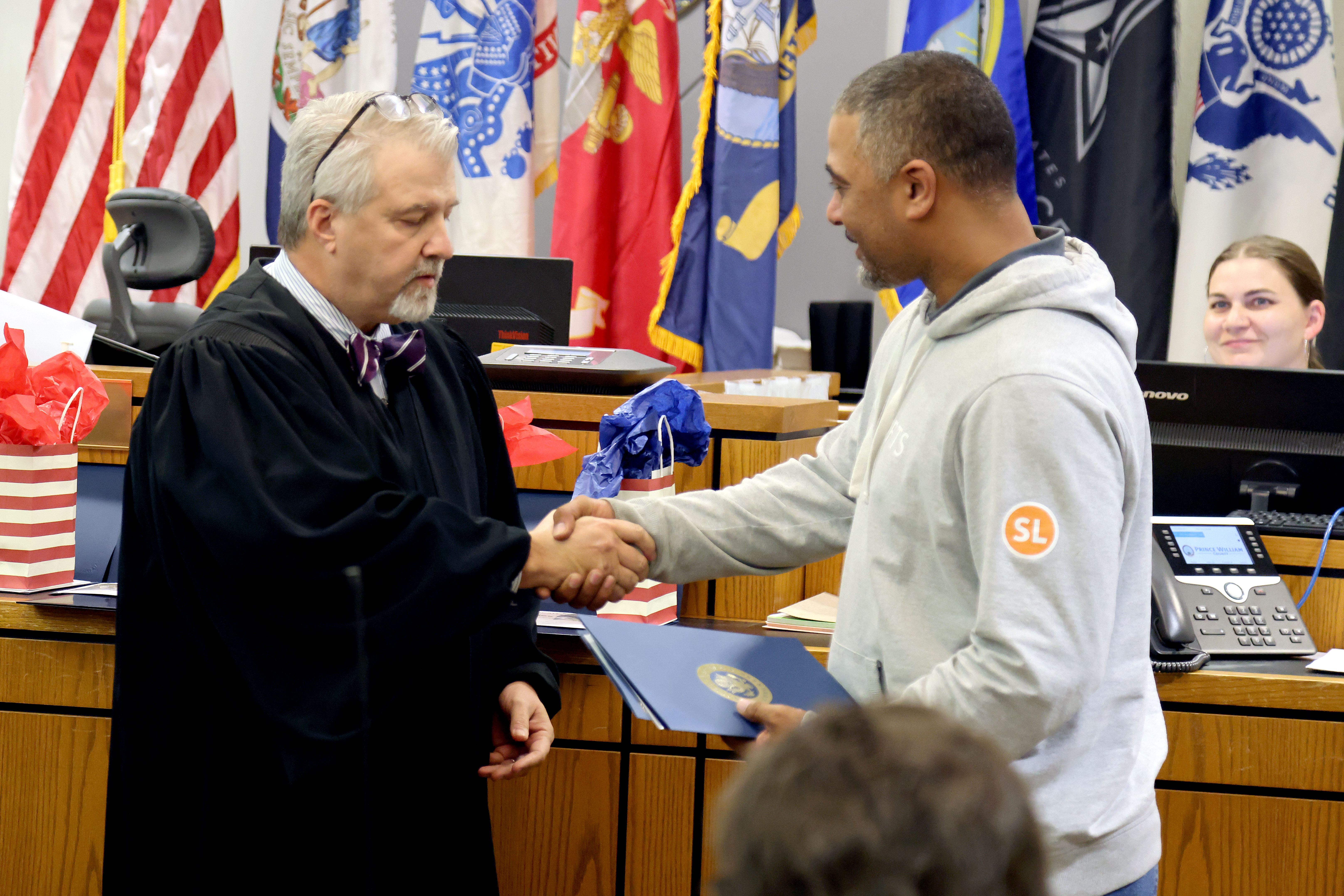Veterans Triumph Over Adversity Through Prince William Veterans Treatment Docket

Graduates of the Greater Prince William Veterans Treatment Docket recently walked out of the Prince William General District Court with more than just certificates of completion.
The program, designed for veterans involved with the criminal justice system, requires participants to attend classes, undergo regular drug testing and appear in court twice a month. Graduates of the docket may see their sentences reduced or dismissed entirely. For the veterans who recently graduated, they had all charges dismissed, marking the culmination of more than a year of dedication and hard work.
"This program really does make a difference. I worked on myself, and I know I'm a better person," said U.S. Marine Corps veteran Angela Matherlee.
Prince William County's docket has a notable track record of success. "We've been very fortunate and blessed that 99 percent of our folks who participated in the docket successfully completed the program," said Prince William County General District Court Judge William E. Jarvis, who presided over the graduation ceremony at the Prince William Judicial Center.
Probation officers, members of the Commonwealth Attorney's Office, public defenders, court staff, county officials, friends, mentors and family joined Jarvis at the courthouse to witness the ceremony and show support for the veterans.
Established in 2019 under authorization from the Virginia Supreme Court, the docket addresses the unique challenges veterans face and connects them to services offered by the Veterans Administration and the Department of Veterans Services. According to the 2022 U.S. Census American Community Survey, Prince William County is home to more than 41,000 veterans. Of these, one in 15 requires substance abuse treatment, and many also face co-occurring mental health challenges such as PTSD or Traumatic Brain Injury.
U.S. Navy veteran Abraham McGee admitted he didn’t know what to expect when he entered the docket, but he quickly discovered a source of unwavering encouragement and support.
"One thing I can say is that you receive a lot of support here," McGee said. "Addiction is a lonely, isolated place. It's good to know there are dockets like this that support us."
Veterans in the program are paired with a mentor who has served in the military.
"Unlike any other kinds of docket, we have something that distinguishes us from everybody else and that is that we have veteran mentors associated with the docket," Jarvis said. "These folks volunteer their time. They don't get paid a dime. They show up to every single docket across the board. Every veteran that participates in this docket tells us how valuable it was to have a veteran mentor associated with them."
U.S. Marine Corps Veteran Travis McQueen, another docket graduate, said the docket gave him the tools to help him through his troubles.
"Last year I had a wakeup call, a kick in the pants," McQueen said "The veterans docket softened that blow to help keep me on my toes [and] realize that I needed to change, to put myself in a better place for my community and the people around me."
Keynote speaker Derek Gondek, a veteran of the wars in Iraq and Afghanistan, commended the graduates for their commitment and encouraged them to view the program as a fresh start.
"Everyone has made a mistake," said Gondek, now a U.S. Senate Budget Committee staff member. "...but just because you made a mistake, the book is not done. You are writing your new chapter starting today."
Other veterans who graduated from the program include U.S. Coast Guard Veteran Roderick Adams, U.S. Army Veteran Eric Reichenbach, U.S. Air Force Veteran Jacob Herndon, U.S. Army Veteran Alex Lucas, III, and U.S. Army Veteran Celso Santiago Mejias.
For more information about the program and to express interest in the program, visit Veterans Docket. To become a member of the Veterans Mentor Team, please visit the volunteer job posting on the county's website.
